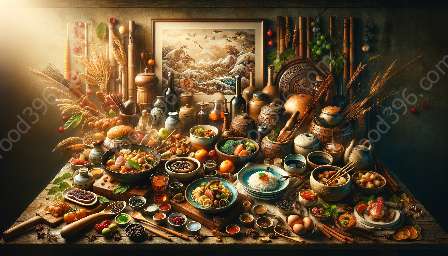Fusion cuisine, a delectable and diverse blend of culinary traditions from different cultures, has a rich and intriguing history that spans centuries. The evolution of fusion cuisine is deeply intertwined with global influences and historical events, shaping the way we enjoy and experience food today.
Early Beginnings
While the concept of fusion cuisine may seem like a contemporary phenomenon, its origins can be traced back to ancient times when trade routes and cultural exchanges brought different flavors, ingredients, and cooking techniques together. These interactions led to the cross-pollination of culinary traditions, resulting in the birth of fusion cuisine in its earliest forms.
The Silk Road and Spice Trade
The Silk Road and the spice trade played a pivotal role in the fusion of culinary cultures. As merchants and explorers traversed the ancient trade routes, they carried with them exotic spices, herbs, and ingredients that significantly influenced the cuisines of different regions. The exchange of goods and culinary knowledge along these trade routes laid the groundwork for fusion cuisine to emerge, as diverse ingredients became integrated into local cooking styles.
Colonialism and Culinary Convergence
During the era of colonialism, the exploration and expansion of empires brought about the mingling of food cultures on a global scale. European colonial powers established colonies in various parts of the world, introducing new ingredients and cooking methods to regions they encountered. This period of colonialism fostered a blending of flavors and culinary techniques, giving rise to a new wave of fusion cuisine that reflected the amalgamation of diverse cultural influences.
Modern Era and Culinary Innovation
The 20th century marked a period of accelerated globalization and increased interconnectedness, leading to the further evolution of fusion cuisine. As travel, immigration, and communication became more accessible, chefs and food enthusiasts began experimenting with cross-cultural culinary fusions, creating innovative dishes that combined elements from multiple traditions.
Globalization and Cross-Cultural Exchange
The phenomenon of globalization has had a profound impact on the development of fusion cuisine. With the ease of travel and the exchange of ideas, ingredients, and culinary techniques across borders, chefs have been inspired to break traditional barriers and fuse different culinary heritages to create bold and innovative gastronomic experiences.
Contemporary Fusion Cuisine
Today, fusion cuisine continues to thrive in the culinary world, with chefs pushing the boundaries of creativity and flavor. In cosmopolitan cities and cultural melting pots, fusion restaurants and eateries offer menus that seamlessly blend elements from diverse culinary traditions, enticing diners with unique and memorable dining experiences.
Embracing Diversity and Creativity
The evolution of fusion cuisine reflects an ongoing celebration of diversity, creativity, and the love for exploration within the culinary realm. By embracing the rich tapestry of global flavors and culinary techniques, fusion cuisine serves as a testament to the cultural interconnectedness that defines our shared human experience through food.
As the world continues to evolve and intertwine, the story of fusion cuisine remains an unfolding narrative, inviting us to savor the harmonious blend of flavors that transcend borders and unite us in the joy of shared culinary experiences.

